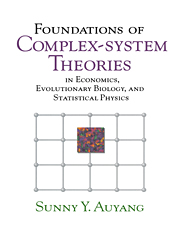
-
Select format
-
- Publisher:
- Cambridge University Press
- Publication date:
- 11 May 2010
- 28 May 1998
- ISBN:
- 9780511626135
- 9780521778268
- Dimensions:
- Weight & Pages:
- Dimensions:
- (247 x 174 mm)
- Weight & Pages:
- 0.75kg, 420 Pages
You may already have access via personal or institutional login
Book description
Complex behaviour can occur in any system made up of large numbers of interacting constituents, be they atoms in a solid, cells in a living organism, or consumers in a national economy. Analysis of this behaviour often involves making important assumptions and approximations, the exact nature of which vary from subject to subject. Foundations of Complex-system Theories begins with a description of the general features of complexity and then examines a range of important concepts, such as theories of composite systems, collective phenomena, and stochastic processes. Each topic is discussed with reference to the fields of statistical physics, evolutionary biology, and economics, thereby highlighting recurrent themes in the study of complex systems. This detailed yet nontechnical book will appeal to anyone who wants to know more about complex systems and their behaviour. It will also be of great interest to specialists studying complexity in the physical, biological, and social sciences.
Reviews
‘The book is comprehensive and interesting to read. … this book will certainly be useful for anyone interested in understanding complex systems.’
Source: Physics World
‘… extraordinarily thoughtful and interesting … it’s beautifully written - simple, crisp, clear, and perceptive …’.
John Ziman Source: Interdisciplinary Science Reviews
Contents
Metrics
Altmetric attention score
Full text views
Full text views help Loading metrics...
Loading metrics...
* Views captured on Cambridge Core between #date#. This data will be updated every 24 hours.
Usage data cannot currently be displayed.
Accessibility standard: Unknown
Why this information is here
This section outlines the accessibility features of this content - including support for screen readers, full keyboard navigation and high-contrast display options. This may not be relevant for you.
Accessibility Information
Accessibility compliance for the PDF of this book is currently unknown and may be updated in the future.


